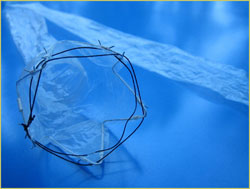Meet The Newest Weight Loss Procedure.

The EndoBarrier lines the intestine preventing absorption of food calories.
Reducing calorie consumption is a proven way to lose weight, but people aren’t always disciplined enough to maintain a reduced calorie diet on their own. That accounts for some of the success and popularity of gastric bypass and gastric band surgeries, both of which reduce the quantity of calories absorbed. But since both procedures carry considerable risks, there’s been strong interest in developing effective alternatives that are less dangerous to the patient.
Makers of a new device called the EndoBarrier say that’s just what they’ve accomplished. The EndoBarrier is a thin plastic sleeve anchored at the junction of the stomach and small intestine. The sleeve extends down through the first 60 cm of intestine, where a great deal of absorption would otherwise take place. By preventing food from coming into contact with the intestinal wall, no calories or nutrients can be absorbed. GI Dynamics hopes the device, still currently in clinical trials, will show effectiveness against obesity and possibly Type II diabetes as well.
Since the EndoBarrier is placed and removed endoscopically, it poses much fewer risks than gastric bypass or band surgeries.
If you like the idea of getting some help in reducing your calorie intake, but would like a less drastic way to do it, consider using some safe and over-the-counter supplements such as:
Glucomannan and other fiber supplements: Let you feel full with much less food and move food through your system faster. Glucomannan is probably the best type of fiber supplement to use for weight loss purposes.
Carb Blockers: Made from a kidney bean extract, carb blockers inhibit an enzyme required to break starch (pasta, rice, bread, potatoes) into simple sugars. In effect, they block a portion of carb calories from being absorbed.
Fat Blockers: Made from the shells of crustaceans harvested for food (crab,shrimp, lobster) fat blockers usually employ an ingredient called chitosan. Chitosan binds up dietary fats, preventing their digestion and eventual absorption. But chitosan fat blockers work through a completely different mechanism that Orlistat based fat blockers like Alli, so they don’t have Alli’s side effects.



